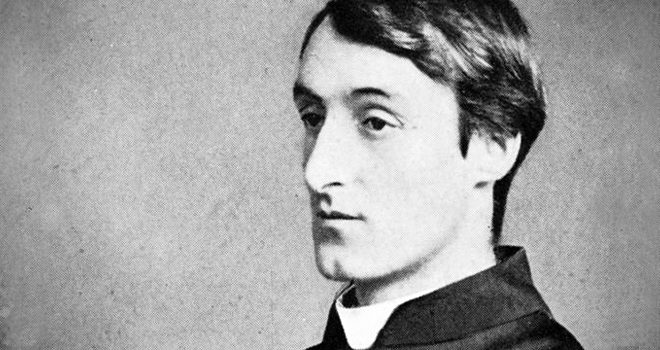I did say yes
O at lightning and lashed rod;
Thou heardst me truer than tongue confess
Thy terror, O Christ, O God;
Thou knowest the walls, altar and hour and night:
The swoon of a heart that the sweep and the hurl of thee trod
Hard down with a horror of height:
And the midriff astrain with leaning of, laced with fire of stress. 2
– Gerard Manley Hopkins
A lot has been said of “I did say yes” in this verse. Let us try to see what he did say , or if he did say at all.“I did say yes” is an emphatic syntactic structure, compared to “ I said yes”. But emphasis on what? And who did he say this? “O at lightning and lashed rod”. It is not “say to” but “say at”. One never speaks to a preposition! “ And there is an interjection intervening between “say yes” and “at”. Is the interjection of a phrase, or is it an address? But there’s an “at” facing it. It is not “O lightning and lashed rod”. There is again an intervening “at”. The interjection mark (!) is omitted, and “at” has taken its place.Nothing, nothing is in order! A syntactic simulacrum of the poet’s inner disorder? Still, the simulacrum must make sense.
The storm has set in , “lightning and lashed rod”, “Hard down with a horror of height”. The master is at his job, “mastering me ”.( Making a Job of the poet! ) Hopkins has caught the master in the act of mastering. But when was this lightning? In “I did say yes”, the poet is recalling what he had said, before the storm has set in. What you say in the storm cannot be the same as what you said in calm. “I did say yes”, but “O at lightning and lashed rod”.“At” here means “ while”, “ at the time of ”. It is not that he would now retract his assent ,but the poet wants to note the difference between a formal assent to the suffering, and the actual suffering.The difference between “ I said yes” and “I did say yes” is this. “I don’t deny,but O…”. The firmest faith has an alloy of unbelief. “Lord I believe, help thou my unbelief.” (Ignatius) The strongest yes has a “no” imbedded in it. Hopkins did say yes.Yet it would be unnatural for him not to recoil, “at” the “ lightning and lashed rod”.
A natural question often asked is, doesn’t God have the power to stop the storm and prevent the terrible tragedy? He could , definitely. If man is merely of earth, for earth .But man has a higher purpose, and God has to “master me” for the higher purpose.
This yes is said thrice in the poem. First by the poet in the past; second, by the “tall nun” before the shipwreck; and third again now by the poet. We will carry it along in the poem .
It is “say at” not “say to”, also because you say “at” someone when you don’t expect to be heard.What the poet did say was strictly a matter between the poet and God. The world has no role in it.(Like in the story of Abraham in the Bible, and in Kierkegaard’s “ Fear and Trembling”.) His saying calls for no witnesses, doesn’t require any attestation from any hearer. But, after all, did he “say” it ? He didn’t. It was an unspoken confession, “Thou heardst me truer than tongue confess”. The assent was at a level deeper and “ truer” than the tongue could confess. And, only God could hear.
But is it at all necessary for the poet to say yes? God doesn’t need your consent to do his job. But it makes things easy for “me’, not for the master though. This little yes is in correspondence with the mighty call of God. It connects the infinite with the infinitesimal. Hopkins said this of “ I did say yes”: “…this is truly God’s finger touching the very vein of of personality which …man can respond to by no play whatever , by bare acknowledgement only.”
God’s creation is never over. The Genesis is an unending chapter. For, there is always the need to say, “Let there be light.” And God says it in several ways. He says it like a feather, he says it like a “ lashed rod”. He could also make you conceive Christ . He has the power. Man needs, not God, to say yes.
“O at lightning and lashed rod”. What is lashed rod? Lash and rod are two different things. “Lashed” can mean two things. One , a rod turned into a lash; two, a rod that received lashes. Hopkins doesn’t forego either meaning. A rod is usually a symbol of kingly authority, earthly. God’s displeasure can punish the mighty kings.In addition to this , Hopkins as is characteristic of him, is showing a thing in action. The rod is a mere symbol,but the lightning lash is in action , a doing-rod. The cries are loud, naturally, at the lashing, “Thy terror, O Christ, O God”.
“Thou knowest the walls, altar and hour and night”: The location and time in this line refer to events in the poet’s life, when he was studying at Oxford. The event preceded his conversion. The circumstances refer to those of his first yes said on God’s mighty call to convert to catholic faith. The first call came like a mighty spear hurled down at him from the heavenly heights with a “sweep”. Hopkins makes use of both of the meanings of “sweep” ,(intransitive verb : to move with a sweep; transitive verb. : to gain or carry off in or as if in a swoop.) It comes down with a sweep, and sweeps away the trash in a fell swoop. The poet swooned at the sudden assault. Conversion is never a process. It is a crash. The poet leaned, “laced with fire of stress”. Lace reminds us of the “world’s strand” in verse 1 . Laced suggests a divine design in lace of fire . “Stress” (“laced with fire of stress”) naturally reminds us of the central concept in Hopkins, namely instress.
Now, it may be worthwhile to have a look again at the concept of instress and inscape, with particular reference to the present poem. Brian Williams in his “Hopkins and Heidegger” puts it like this: Inscape is ontological, the meeting of the One and the Many,unity and variety in the unique object of the poet’s “seeing’. Instress is the phenomenology of “seeing’.Inscape rests within the object in the play of of unity in disunity, instress allows the insight into the inscape.” Hopkins says : “I know the beauty of our Lord by it.” The beauty of the Lord lies in the lacing together, albeit in fire, of individuals, retaining their individuation. Many are laced into one without ceasing to be many.
A word about Hopkins’s disjointed syntax. Hopkins has a purpose in removing the causal connectives in his syntactic structures. Sometimes , his lines are just a heap of objects. He does it because he wants to retain the individuality of each of the things he “sees”. He is against the Victorian mass approach to things. Also, because, the interconnection of the things is not in the things ( inscape ) but in the seeing (instress).
**
The frown of his face
Before me, the hurtle of hell
Behind, where, where was a, where was a place?
I whirled out wings that spell
And fled with a fling of the heart to the heart of the Host.
My heart, but you were dovewinged, I can tell,
Carrier-witted, I am bold to boast,
To flash from the flame to the flame then, tower from the grace to the grace. 3
Verse 3 is referring to some event in the poet’s life ,his decision to become a priest, join the Jesuits, or something else.God knows where and when, (“Thou knowest the walls, altar and hour and night ”: Verse 2) It is difficult to put the spiritual experience in words. It can be done only in images.
Literally, the poet is between the devil and the divine wrath.( “The frown of his face
Before me, the hurtle of hell /Behind”). He knows the divine wrath, and sees the hurtling hell. This is a sign of spiritual awakening, a sign that a person is spiritually activated. A “ normal “ person would know neither.But the spiritually activated person finds it a dreadful and intolerable state. Man wants to flee, but “where, where was a, where was a place?” The first “where” is just unthinking panic; the second “ where is a” , is the sign of the operation of the intelligence; the third, “where was a place?”, is clearer of what he wants. There is now a frantic search for a place to hide oneself, but there is no third place . There is however, difference between the two, before him and behind him. The divine wrath has a “face” and a frown , but hell is faceless, it is million-faced. Also, the frowning face is still, but the hurrying hell is hurtling. God waits for man to come to him, Satan is in a hell of a hurry.
The poet now knows what to do. But now there is no frantic search for a place, “where, where was a, where was a place?” He knows what to do. His heart is a dove , and is “carrier-witted”, (Carrier-witted means having the homing instincts of a carrier pigeon.) It well knows its way home. “I whirled out wings that spell /And fled with a fling of the heart to the heart of the Host.” What is actually happening here? The poet’s heart- dove fled not to the “frown of his face”,but “to the heart of the Host.” The frown is on the face, but mercy is in the heart. It is not flight, though “ fled” would have us believe that, but a “ fling”. “ Spell ” here can mean two things. One, to be under a spell; and wanting to rest,or give rest . It suggests the spellbound state of the poet at the moment of that awesome spiritual experience. Anyway, the wings are not needed. The dove can give its wings a spell. So, “Whirl out wings” does not mean spread out wings preparing to fly.Wings are at rest. The poet’s heart has the intuition that it is home.There is no need to fly away. “ Whirl” suggests circling. ( Hopkins in an untitled poem of his says: “Let me be to Thee as the circling bird”.Several of Hopkins’s poems have separate titles. They go by their opening lines. ) .There’s actually no flight, only a fling, yet again a fling not towards something, but to itself ! A circling that takes the poet’s heart nowhere but to itself, his heart now become the heart of the Holy Host, (“And fled with a fling of the heart to the heart of the Host.”)
‘They saw what seemed to be tongues of fire that separated and came to rest on each of them. All of them were filled with the Holy Spirit.’ (Acts 2:3-4)
The poet is now filled with the Holy Spirit, and become one with the Dove. “My heart, but you were dovewinged”. The dove has the dual aspect of the powerful master and the submissive serf. The Dove also symbolises the dual aspect of the Holy Spirit, of terror and compassion. The two become One in the Dove, the master and the serf, terror and love. Here it may not be incongruous to recall Eliot’s “ dove ”:
The dove descending breaks the air
With flame of incandescent terror
Of which the tongues declare
The one discharge from sin and error.
The only hope, or else despair
Lies in the choice of pyre or pyre-
To be redeemed from fire by fire (Little Gidding)
Eliot’s dove descends “With flame of incandescent terror”, and , the “ only hope”. The choice is between the fires of hell, and the purgatorial fires, “The one discharge from sin and error.” This dual aspect of God is also the recurring theme of Hopkins’s poem. The last line of verse 3 is indeed repeating this paradox of God, terrifying and loving. “To flash from the flame to the flame then, tower from the grace to the grace.” The poet moved like a flash “from the flame to the flame”. The first flame is infernal, and the second, the fire of spiritual regeneration through the Holy Spirit. The tower suggests that the dove is soaring high in divine grace. The tower is also the shelter. “The Lord is my rock and my fortress … my high tower’. (Psalms 62:2).
Titbit:
“My verse is less to be read than heard… You say you would not read my poem again for any money. Nevertheless I beg you will. Besides money, you know , there’s love. If it is obscure do not bother yourself with the meaning but pay attention to the best and most intelligible stanzas, as the two last of each part and the narrative of the wreck.” (Hopkins to Bridges)
This is a piece of advice more useful for us than to Bridges, who was his lifelong friend, but not a great admirer of his poetry. But their friendship was unaffected by it, and remained warm till the last. Bridges,who was instrumental in bringing out the first edition of Hopkins’s poems, described this poem as “ a dragon at the gate”.(It was the first poem in the first edition of Hopkins’ Works.)
(Continued)









Add comment